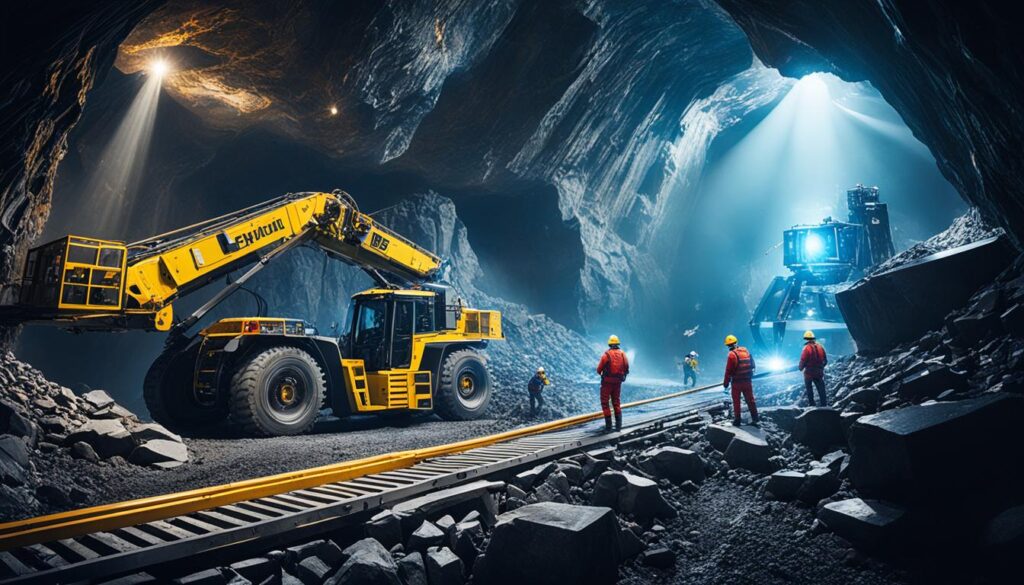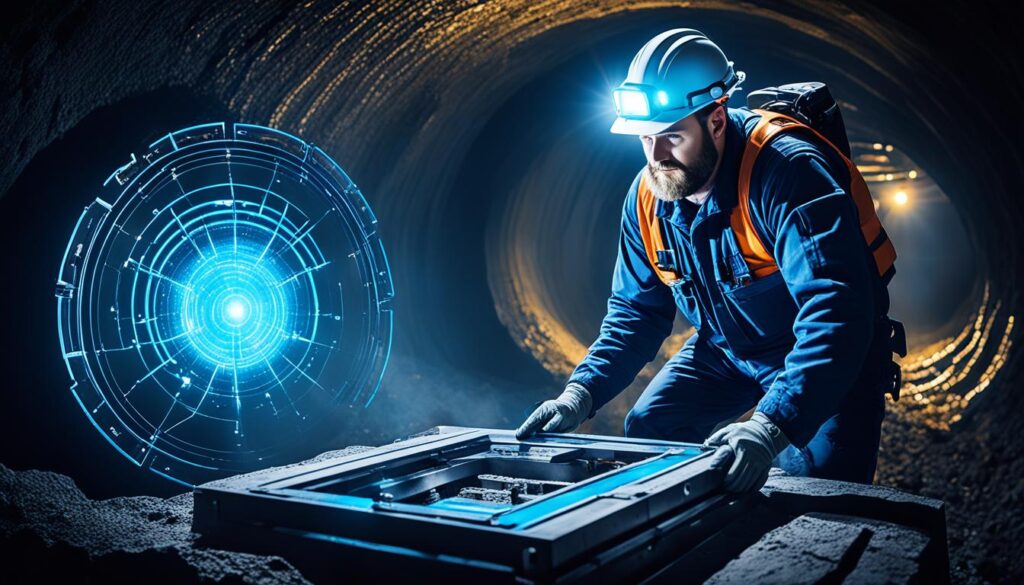The advent of quantum computing is set to transform the mining industry, introducing a new era of mineral extraction marked by unmatched efficiency, safety, and sustainability. The escalating demand for critical minerals and metals, fueled by the rapid expansion of clean energy technologies and digital infrastructure, underscores the urgency for innovative solutions to enhance mining efficiency. This need is more critical than ever.
Quantum computers, renowned for their capability to execute complex calculations and simulations at an exponential rate, are pivotal in unlocking new horizons in the future of mining. By leveraging quantum algorithms and machine learning, mining entities can address some of the industry’s most daunting challenges. These include geological modeling, exploration, logistics, and supply chain management.
The adoption of quantum computing in mining is anticipated to significantly influence the industry. It promises more accurate and cost-efficient mineral exploration, improved mining safety, and a diminished environmental footprint. As we delve into the potential applications of quantum computing in mining, it’s evident that this transformative technology will be instrumental in defining the future of this vital sector.
The Potential of Quantum Computing in the Mining Industry
The mining sector faces significant hurdles, including decreasing ore quality, remote operations, and growing environmental worries. These issues underscore the need for groundbreaking solutions to enhance mining efficiency. Quantum computing stands out as a cutting-edge technology poised to transform the industry.

Quantum computing could fundamentally alter how we explore resources and optimize mining. Through advanced quantum algorithms, mining entities can craft more precise geological models. This enables pinpointing of high-grade ore deposits, thus streamlining exploration efforts. Such efficiency cuts down on costs and reduces environmental footprint.
Quantum computing also has the potential to refine various mining facets, such as:
- Boosting the efficiency of extracting and processing ore
- Optimizing transportation and logistics networks
- Improving predictive maintenance for mining equipment
- Facilitating real-time decision-making with vast data sets
This technology could significantly slash costs, elevate productivity, and boost the sustainability of mining operations. As it evolves, quantum computing is set to be a cornerstone in the mining industry’s future. It will help companies navigate challenges and stay competitive in a dynamic market.
How Quantum Computing Will Revolutionize Underground Mining in the Future
Quantum computing is set to transform underground mining by offering unparalleled insights and optimization capabilities. Quantum technology’s most promising mining application is the use of quantum sensors for enhanced geological mapping and mineral exploration. These devices can detect minuscule changes in gravity, magnetic fields, and other physical properties. This enables the creation of highly accurate 3D models of underground mineral deposits.

Quantum computing will also revolutionize mine planning and design. It leverages the immense computational power of quantum computers to simulate complex geological structures and optimize mine layouts for maximum efficiency and safety. Quantum algorithms can analyze vast amounts of data from various sources, such as drill cores, seismic surveys, and production records. This helps identify patterns and predict potential issues before they occur.
Quantum computing will also significantly improve safety in underground mining. Quantum-enhanced monitoring systems can provide real-time data on mine shaft stability, hazardous gas presence, and equipment performance. By processing this information with quantum algorithms, mining companies can swiftly detect and respond to safety threats. This minimizes the risk of accidents and injuries.
Moreover, quantum computing can optimize the maintenance and performance of mining equipment. Quantum algorithms analyze sensor data from machinery components to predict when maintenance is needed. This reduces downtime and extends the lifespan of expensive mining assets. Predictive maintenance improves operational efficiency and enhances the safety of underground mining operations.
As quantum computing advances, its applications in underground mining will grow more sophisticated and widespread. The combination of quantum sensors, simulation, and algorithms will enable mining companies to make more informed decisions. This will optimize their operations and prioritize worker safety. The quantum-driven revolution in underground mining will enhance the industry’s efficiency, profitability, and sustainability.
Quantum Algorithms for Geological Modeling and Exploration
The mining industry is on the cusp of a significant transformation, thanks to quantum computing. Quantum algorithms are set to revolutionize geological modeling and mineral exploration. They promise to analyze vast geological data with unprecedented accuracy, identifying patterns and predicting mineral deposits’ locations.
Quantum algorithms excel in processing massive datasets at speeds classical computers cannot match. They utilize quantum superposition and entanglement to explore multiple solutions simultaneously. This capability is essential in geological modeling, where data complexity can be daunting.
These algorithms apply to various geological modeling and mineral exploration aspects. They help develop predictive models that consider numerous variables like geophysical data and geochemical signatures. By integrating these datasets with quantum-enhanced machine learning, geologists can create accurate maps of potential mineral deposits in unexplored areas.
Quantum algorithms also optimize exploration program design and planning. They simulate scenarios and evaluate outcomes to pinpoint the most promising drilling targets. This targeted approach cuts down exploration costs and boosts the success rate of mining projects by allocating resources more effectively.
Quantum algorithms aren’t just for land-based exploration. They’re also vital for deep-sea mineral exploration, such as seafloor massive sulfides and polymetallic nodules. By analyzing vast amounts of data, these algorithms can identify the best areas for underwater mining, expanding mineral exploration horizons.
As quantum computing evolves, we’ll see more advanced algorithms and applications in geological modeling and mineral exploration. The fusion of quantum technology with traditional methods will usher in a new era of efficiency and discovery in mining. This will lead to the sustainable extraction of Earth’s valuable minerals.
Quantum-Enhanced Robotics and Automation in Mining
The fusion of quantum computing with robotics and automation is set to transform the mining sector. Quantum robotics could make mining operations autonomous, thus reducing the need for humans in perilous settings. Quantum algorithms will enable mining firms to better manage and coordinate mining robots, boosting efficiency and productivity in remote settings.
Quantum computing surpasses traditional robotics in mining automation by processing vast data and executing complex calculations swiftly. This capability facilitates real-time decision-making and adaptive control of mining robots. Quantum-enhanced systems enhance robots’ navigation in complex underground spaces, obstacle avoidance, and teamwork.
Quantum-enhanced robotics and automation in mining offer several advantages:
- Increased safety: Autonomous mining robots can operate in hazardous areas, reducing human risk.
- Enhanced productivity: Quantum algorithms optimize the coordination of multiple robots, leading to quicker and more efficient mining.
- Improved precision: Quantum sensors enable precise mapping and localization of underground resources, enhancing mining accuracy.
- Reduced costs: Automation powered by quantum computing cuts labor costs and improves operational efficiency.
As quantum computing evolves, its integration with robotics and automation will open up new possibilities for remote mining. Mining firms adopting this cutting-edge technology will gain a competitive edge, ensuring worker safety and well-being.
Addressing Sustainability Challenges with Quantum Computing
The mining industry is under growing pressure to adopt sustainable practices. Quantum computing is stepping up as a key solution to environmental challenges. It uses quantum algorithms to optimize resource use, cut down on waste, and lessen environmental impact. This technology enables complex models that simulate geological formations accurately, leading to more precise and efficient exploration.
Quantum computing is also vital for sustainable mining. It helps streamline mining operations by reducing energy use and cutting down the carbon footprint. Quantum-enhanced data analysis uncovers opportunities for responsible resource management, ensuring mining can be sustained over the long term.
Quantum computing is set to transform how we handle environmental stewardship in mining. By leveraging quantum technologies, mining firms can enhance their efficiency and aid in fighting climate change. As quantum computing advances, we’ll see more innovative solutions, leading to a more sustainable mining future.
